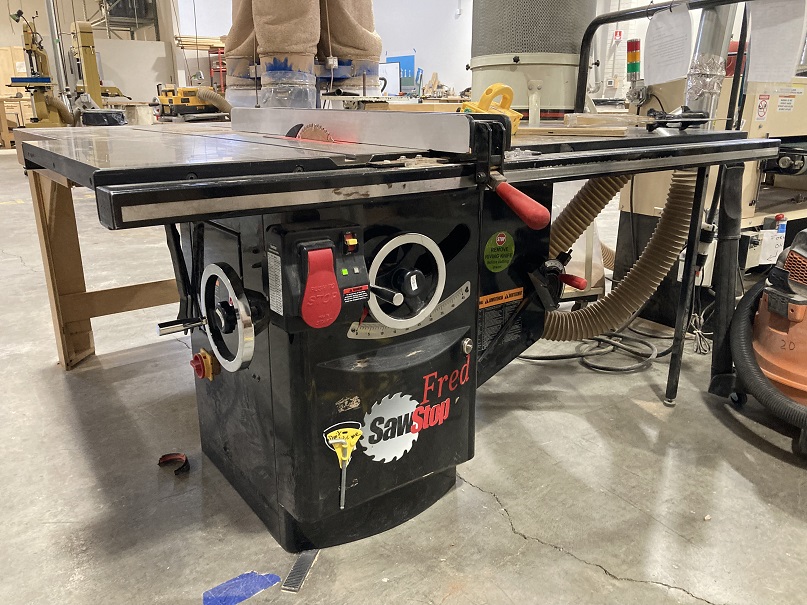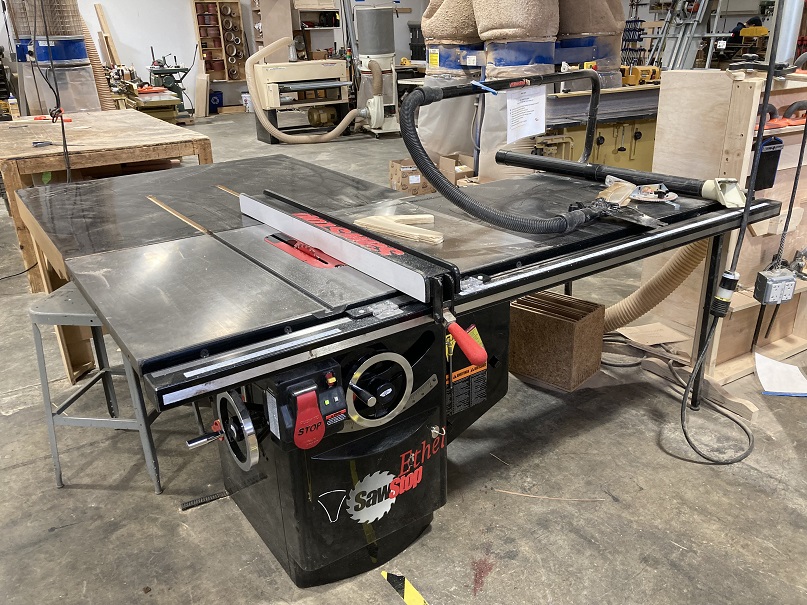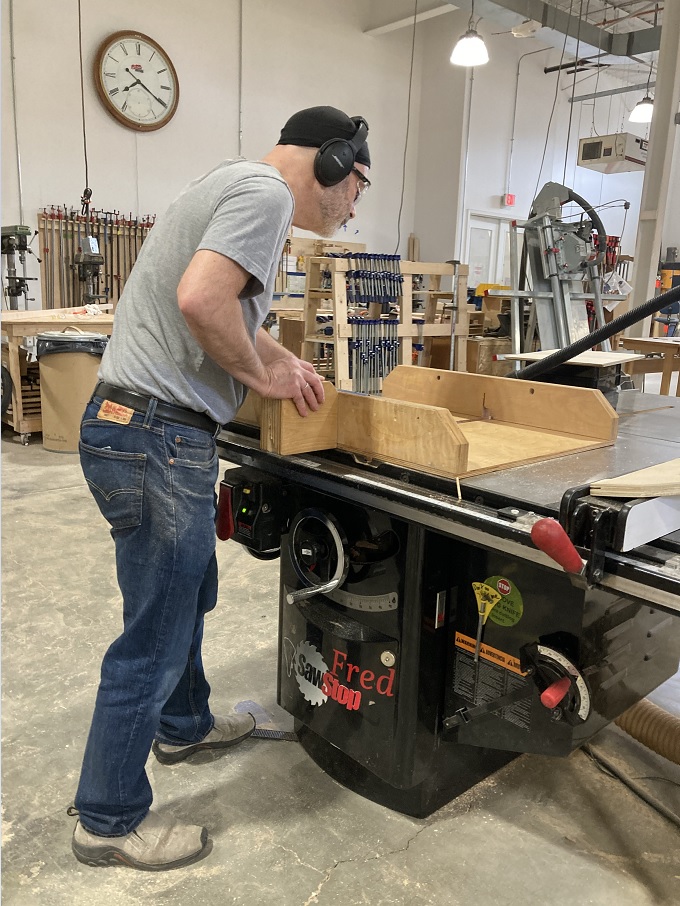Saw Stop Table Saw: Difference between revisions
No edit summary |
No edit summary |
||
| Line 22: | Line 22: | ||
* "Fred" is located close to the main door in the northeast corner of the room. It uses a ?-Hp 3-phase 240-volt motor. | * "Fred" is located close to the main door in the northeast corner of the room. It uses a ?-Hp 3-phase 240-volt motor. | ||
{| class="infobox" cellspacing="5" style="width: 22em; text-align: left; font-size: 100%; line-height: 1.5em;" | |||
! colspan="2" class="infobox-image" | [[File:Table_saw_Fred_reduced.jpg|100px|Fred small]] | |||
|- | |||
| colspan="2" | Fred in repose | |||
|- | |||
|} | |||
* "Ethel" is located opposite, in the southwest corner of the room. It uses a single-phase ?-Hp 240-volt motor. | * "Ethel" is located opposite, in the southwest corner of the room. It uses a single-phase ?-Hp 240-volt motor. | ||
{| class="infobox" cellspacing="5" style="width: 22em; text-align: left; font-size: 100%; line-height: 1.5em;" | |||
! colspan="2" class="infobox-image" | [[File:Table_saw_Ethel_reduced.jpg|100px|Ethel small]] | |||
|- | |||
| colspan="2" | Ethel relaxing | |||
|- | |||
|} | |||
==Use For== | ==Use For== | ||
Revision as of 21:07, 11 February 2024
| Saw Stop 10-inch Table Saw | |
|---|---|
| General Info | |
| Make | Saw Stop |
| Model | ICS53230 |
| Serial | |
| Specs | |
| Manual | Manual |
| Asylum Info | |
| Location | Wood Shop |
| Rubric | |
| Training | |
| Testing | |
| Restrictions | red |
The Wood Shop has two table saws in opposite corners of the room:
- "Fred" is located close to the main door in the northeast corner of the room. It uses a ?-Hp 3-phase 240-volt motor.

| |
|---|---|
| Fred in repose |
- "Ethel" is located opposite, in the southwest corner of the room. It uses a single-phase ?-Hp 240-volt motor.

| |
|---|---|
| Ethel relaxing |
Use For
- Dry lumber
- Boards
- Plywood sheets
Do Not Use For
- Pressure-treated
- Wet lumber
- Plastic
- Metal
- Carbon-filled composites
Table Saw Safety Notes
| Eye protection required! | ||
|---|---|---|
- Saw stop technology detects blade contact with the skin and stops the blade within milliseconds. It doesn't prevent injury, but minimizes the severity when used correctly. Disabling the mechanism risks much worse injury.
- Dust: All forms of dust are hazardous, some particularly so. Always use the dust control system, and it is recommended that you also wear a dust mask.
- Keep the guards in place.
- Remove wrenches and adjusting keys before switching on the saw.
- Remove clutter from the top of the saw.
- Keep hands out of the line of the saw blade.
- Use a push-stick when required
- Use the blade guard and spreader (or riving knife) for every operation where possible, including all through sawing.
- Never reach around or over the saw blade.
- Never try to test-fire the brake system.
- Unplug the saw before changing the blade or servicing.
- No loose clothing, neckties, rings, bracelets, or other jewelry. Non-slip footwear. Tie back or cover long hair.
- Keep proper footing and balance at all times
- Unplug the saw before servicing or changing blades.
- Never stand on the saw.
- Perform a safety check:
- Alignment of moving parts
- No binding or rubbing
- Make sure accessories are mounted properly
- Repair or replace damaged guards or other parts
- Feed the work against the direction of rotation of the blade.
- Never leave the saw running unattended.
- Always maintain firm control over the material being cut. Never cut freehand.
- Never operate with the access doors open.
The SawStop Safety System
The device doesn't prevent injury. In fact, injury must occur before the system can react. How severe an injury depends on how fast the person is moving. This machine includes an electronic detection system and a fast-acting brake to reduce the potential for serious injury during accidental contact with the blade.
The mechanism is contained in a cartridge underneath the cutting table that is activated by contact with human skin. When this happens, a strong spring forces an aluminum brake shoe into contact with the blade, retracting and stopping it within a few milliseconds.
Practically, if the user's hand moves at about 1 foot per second, the blade will have stopped by the time the hand has moved about 1/20 of an inch, so the user will incur a scrape about that deep. Body parts that are thrown in faster will be cut deeper, even if the system works perfectly.
The cartridges can only be used once: Once triggered they must be replaced. This also destroys the blade.
The blade retracts into the table when the brake is activated. Reaching UNDER a spinning blade when the brake is activated may cause a serious injury.
For those electronics geeks among you, the system applies a high-frequency electrical signal to the blade that is tuned to the impedance of the human body. Touching the blade decreases the amplitude of the signal significantly, causing the control system to trip the spring on the brake shoe and stop the blade.
Wood doesn't trigger the mechanism.
Electrically conductive materials such as metal, carbon-filled, or metal-coated sheet materials WILL trigger the brake, as will wet pressure-treated lumber, so they should NOT be cut using this machine unless necessary precautions are taken. Refer to Page 33 of the manual.
Blades that don't have the specified diameter for the SawStop system won't benefit from it. There is a special cartridge for 8-inch dado blades up to 13/16" thick, but cutters known as "molding heads" won't benefit from the system. Just to be clear, we mean: "Molding head" and not "Head molding".
